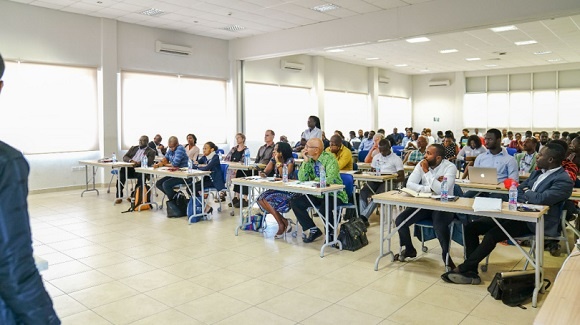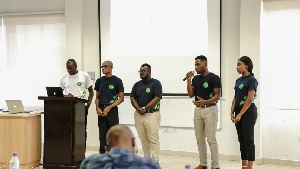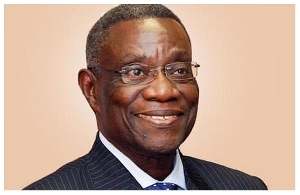- Reflections from a capstone entrepreneurial project at Ashesi University
Etched on a glass wall – at the entrance of Ashesi University [at Berekuso, Eastern Region, Ghana] – is the following quote from the German poet / scientist, Wolfgang Goethe (1749 – 1832): “Whatever you can do, or dream you can do, begin it. Boldness has genius, power, and magic in it. Begin it now.” In essence, a projection or a mental picture has the possibility of coming into existence solidified as a product, a service, or a solution to a societal problem. Everything has its beginning in an imagination, a thought.
Capstone Entrepreneurship I
Educational reform proper involves the spirited daring mindset the youth get out of the learning experience – especially how various courses and lectures can be adjusted to induce hands-on field experiences. The practical problem solving entrepreneurial tempo was all the more striking, and so the Ashesi capstone option is open to seniors in Business Administration, Management Information Systems, and Computer Science.
The Capstone Entrepreneurship I course was aimed at helping students find innovative business opportunities, and then develop processes and models “to ensure problem-solution and product-market fit.” Students were then to undertake various assignments and engage in efforts “out of the building” to engage customers and other stakeholders to ensure that the models used were “user-centric”. At the end of that semester, student teams presented their business models for a feedback and Minimum Viable Product (MVP) testing efforts. The Christmas holidays were spent testing various MVPs to further validate their business models.
The Capstone Entrepreneurship II
The Capstone Entrepreneurship II was to aid venture teams validate their business models by undertaking more customer and stakeholder engagements to validate further their product-market fit and gain some early adopters or “earlyvangelists” to patronize their products / services, and pay for them. That stage forms the execution aspect of the customer development process.
In the final business pitch evaluation, the teams were rated according to well defined indices such as Problem-Solution fit, Business Model, Stakeholder Engagement, Product-Market Fit, Venture Viability, and Venture Offering. In the end, the panelists were to judge the quality of the pitch and the stories behind the presentations. Finally we were asked, “Is this a business model you will encourage the team to carry on with after graduation?” The models included apps for transport, food, cosmetics, etc.
It was an honour to have been invited by the instructor, Dr Sena Agbojah Agyepong, to motivate and share views at the start of that first semester, and also at the end of the second semester as a member of the panel of experts.

Panel listening to students present projects
The mind is not a stale filing cabinet
The mind is not a filing cabinet where we file our education and then disappear. In the 21st century, being able to apply what one studied is the key to attaining greater heights and confidence. Projects move learners from “knowing about” to “knowing how”. And there is hardly any subject under the sun that cannot have a practical handle to it.
A person whose optimal knowledge was confined to the statable facts and principles – the kind found in textbooks and heard in lectures – would very likely be frustrated, dull, impractical and socially deficient.
As I’ve often said, life is not static and the role of educators is changing so rapidly that the exit certificates must mean something of value; something much more than a summation of indolent theories stacked sky high; something with skills that support a lifetime of productivity and fulfillment; something that engages the head, heart and hands for lifelong learning and doing. The essence of education today is to prepare the citizens accordingly to help address such challenges.
Critical thinking
Today, merely passing an examination serves as indicators of possibilities only; it is not an accomplishment; it merely shows potential. Personal inquiries and open-ended tasks requiring students to creatively integrate different subjects to find real life solutions to nagging societal problems qualify as accomplishments.
Critical thinking, then, tends to be reflective; it is aimed at what to value, what is purposeful, and what to start doing. It asks the kind of person one wants to be, the kind of life one wants to live; and for a bigger picture, the kind of country we want to live in. An important variable in the equation, then, is what one can contribute to humanity to make life meaningful for all.
Ashesi University wins a Presidential Charter
Weaned from the University of Cape Coast, with which it had previously been affiliated, the charter grants Ashesi an independent degree granting autonomy. It will formally be presented at its 2018 graduation ceremony, and make Ashesi the youngest private university in Ghana’s history to receive the approval.
As its President, Patrick Awuah put it, in a response to my congratulatory message, “It feels so good to have finally achieved this milestone.” A momentous landmark indeed! Ayekoo!
Email: anishaffar@gmail.com
Opinions of Wednesday, 16 May 2018
Columnist: anishaffar.org















